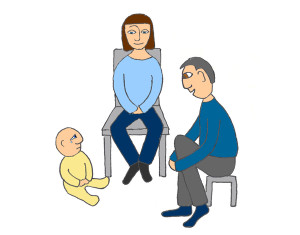Professor Tronick and his researchers have discovered that depressed mothers tend to either disconnect their emotional contact with the baby or, in contrast, get too close to the infant. Children of the first category protest and then give up. Regarding mothers in the second category, their babies try to avoid their gaze when they impose themselves on the little one. What do such children feel and think? To answer, I will use my experiences from psychoanalytic parent-infant psychotherapy (PIP).
It seems as if the baby is afraid of the experiences that s/he has been occupied with while being with the sad mother. With somewhat older children, you can reconstruct how the mother seems to have been experienced as frightening or incomprehensible. This fantasy mother is not identical with the real mother. After all, the latter tries desperately to get in contact with her child. It might seem frightening that little people are sensitive to how their immediate surrounding is feeling and signalling. But there is no reason to be pessimistic. Instead it is important to seek help – because such help indeed exists!
In these situations, the therapist needs to turn to the baby and convince him or her that the “ghost” is not dangerous; nothing is broken. “Mummy has been sad but now she wants to help as best as she can”. Therefore, the therapist needs to convey to the child that nobody gains from avoiding his or her mother’s gaze. On the contrary, it only makes things worse.

It might seem like magic, or even weird, that a therapist speaks with babies. Let me, however, leave this page with a question and a recommendation. Question: if babies do not understand emotional communications, why on earth have parents spoken with their little ones, from time immemorial? Recommendation: under “Read&Look”, you can have a closer look on what this is all about.
